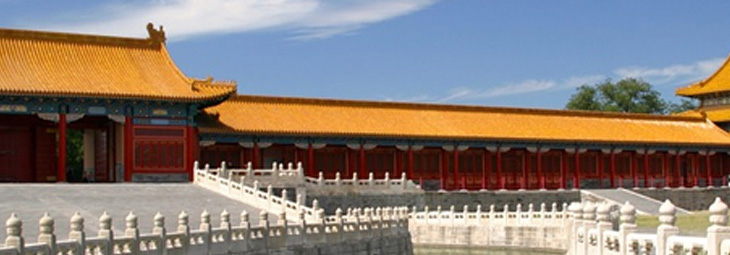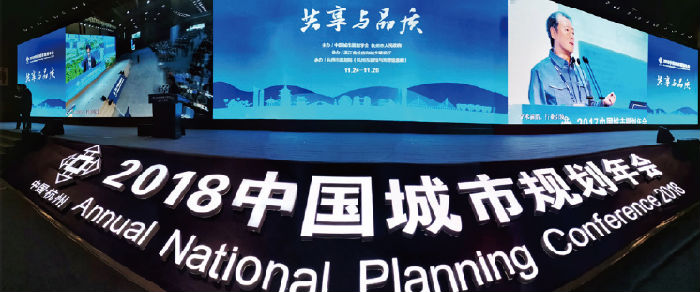


The Annual National Planning Conference 2018 (shortened as the Conference hereinafter) was held from Nov. 24 to 26, 2018, at Hangzhou International Expo Center situated on the beautiful bank of Qiantang River. It is the second time after 17 years for Hangzhou to be the host city since the 1st Annual National Planning Conference in 2001. The Conference was co-sponsored by the Urban Planning Society of China (shortened as UPSC hereinafter) and the Hangzhou Municipal Government, co-organized by the Zhejiang Provincial Department of Housing and Urban-Rural Construction, and hosted by the Planning Bureau of Hangzhou. As the most participatory academic event with the highest level of standards and the widest influence in Chinese urban planning, it attracted more than 9,500 elite attendees gathering together to share their insights on and discuss about the theme “Sharing and Quality” across various areas and at multiple levels, as well as acquiring 3,915 paper submissions. Editors from CCPR participated in the real-time reporting of the Conference.
The Conference included a Plenary Session and more than 60 parallel sessions. Shi Nan, Vice President and Secretary General of the UPSC, moderated the opening ceremony in the morning of November 24, during which he stressed that sticking to sharing and quality is a commitment of all planners and an integral part to implement the spirit of the 19th CPC National Congress and thought on socialism with Chinese characteristics for a new era. Sun Anjun, President of the UPSC, Peng Jiaxue, Vice Governor of Zhejiang Province, Zhou Jiangyong, Member of the Standing Committee of the CPC Zhejiang Provincial Committee, Secretary of the Hangzhou Municipal Party Committee, and Martin Dubbeling from the International Society of City and Regional Planners delivered speeches successively to congratulate the opening of the Conference.
Hangzhou is a city of high quality, said by Shi Nan, where the historic and cultural elements are well integrated into urban development, and the remarkable number of guests attending the Conference this year obviously shows the attraction of this city. As was introduced by Zhou Jiangyong, the Hangzhou Municipal Government has always attached great importance to urban planning. Starting from the preparation of the first urban master plan in 1945, the planning principles are always adhered to both inheriting traditions and advancing with the times. Nowadays, with the goal of ranking among the modern international metropolises, Hangzhou actively adopts the latest concepts of urban planning and construction such as “smart growth,” “compact city,” and “sponge city,” and continuously deepens the research on major issues such as urban functional positioning and spatial layout to improve the progressiveness and authority of planning.
In the following section, 8 distinguished experts were invited to deliver keynote speeches on a series of heated issues in urban planning from perspectives of sharing and quality, urban sustainable development, livable city, regeneration of urban historic space, wisdom of urban planning in China, eco-product of urban sharing, development of healthy city in China, and thoughts regarding the planning of Xiong’an.
Huang Yan, Deputy Director of the Ministry of Housing and Urban-Rural Development, delivered a speech titled “Improving Urban Quality Through High-Grade Design and Planning, Promoting Sharing Through Extensive and In-Depth Joint Planning, Construction, and Governance.” She pointed out that high grade refers to the refined design of various carriers in the city, which corresponds to the improvement of professional quality; while the extensive and in-depth joint planning, construction, and management is towards the real community and people, which requires a change in working mode. In this regard, Huang Yan suggested that attention should be paid to the upgrade and regeneration of urban built-up areas, to the overall planning and design of urban public space and environment, to the drastic changes of urban lives, operation, and management brought by new technologies. Xu Liyi, Mayor of the Hangzhou Municipal Government, enthusiastically gave a detailed report on Hangzhou’s urban development plan centering on the theme of “Sharing and Quality.” Zhang Wenzhong, Deputy Director and Researcher of the Institute of Geographical Sciences and Natural Resources Research at the Chinese Academy of Sciences, analyzed livable cities based on their research on the perspectives of residents. Chang Qing, Professor of the College of Architecture and Urban Planning at Tongji University, Academician of Chinese Academy of Sciences, put forward thoughts on the issue of urban and rural historic space regeneration based on his project practices. Wang Shusheng, Vice President of Xi’an University of Architecture and Technology, introduced the exploration and research carried out by his team on China’s traditional urban planning. Wang Jinnan, Dean of the Chinese Academy for Environmental Planning of the Ministry of Environmental Protection, Academician of the Chinese Academy of Engineering, analyzed the status quo and improvement ideas of urban ecological environment in terms of supply and demand of urban high-quality eco-products. Gong Peng, Director of the Department of Earth System Science of Tsinghua University, shared his opinions on the development of healthy cities in China from aspects of origin and problems of urban health, and healthy city construction practice. Finally, Professor Yang Baojun, Dean of the Chinese Institute of Urban Scientific Planning and Design, published a keynote report on Xiong’an Planning, in which he summarized the key planning concepts, i.e., collaboration, relocation, structure, ecology, resilience, green, innovation, integration, and culture.
It is also noteworthy that in the Plenary Session, the UPSC awarded the Outstanding Workers of Urban Planning Society of China during 2017 - 2018, the Fifth National Award for the Best Scientific and Technical Workers, and Excellent Organization Award of the Annual National Planning Conference 2018, and winners of the “Western Light” College Students’ Summer Holiday Planning & Design Competition, for their outstanding achievements and contributions in related fields.
As the most influential and authoritative academic event regarding urban-rural planning of China, aside from the Plenary Session, the Conference brought about the most forward-looking, international, and fruitful achievements of China’s urban-rural planning and development, and provided worthy ideas for the future development of Hangzhou and nationwide cities through 26 special conferences, 28 academic dialogues, 4 special dialogues, and 2 high-end dialogues, covering special conference topics such as urban ecological planning, urban regeneration, planning implementation and management, and academic dialogue topics including cross-regional cultural heritage protection, inheritance and shaping of urban characteristics, etc. On Nov. 26, 2018, the Conference was successfully concluded by a series of field trips themed around urban planning and construction, which further manifested the unique charm and features of Hangzhou.
Edited & Translated by Liu Jinxin
Proofread by Liu Jiayan